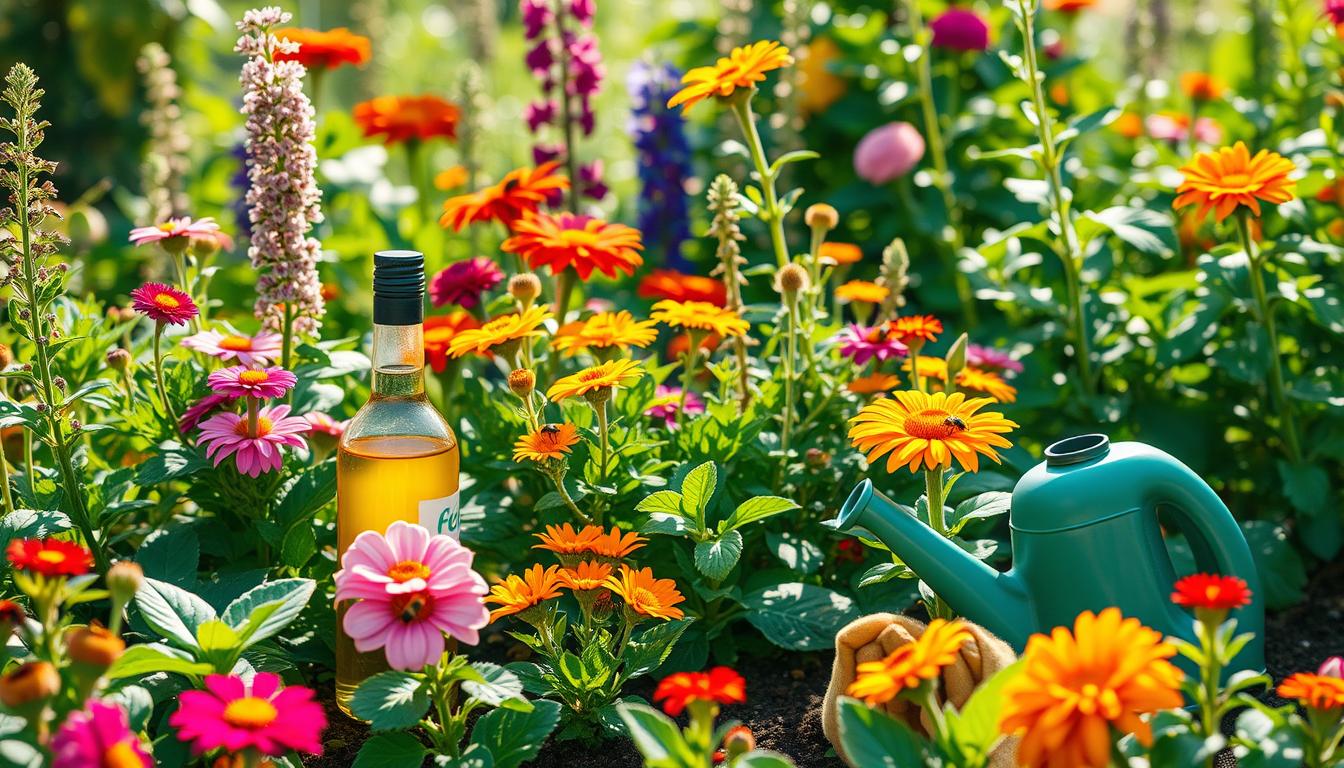As a gardener, I know how vital it is to protect my plants from pests. I also want to do it without harming the environment. That’s why I’m excited to share my insider tips on the best insecticides for gardens.
Using the top insecticides for garden pests is key to keeping your outdoor space looking great. I’ll talk about the different types of insecticides, including organic ones for gardens. This will help you make a smart choice.
In this article, I’ll give you the info you need to pick the best insecticides for your garden. Whether you’re looking for chemical or organic options, I’ve got you covered. By using the right insecticides, you can keep your plants healthy and thriving. And you’ll enjoy a beautiful outdoor space all year round.
Understanding Insecticides: What You Need to Know
As a gardener, I’ve learned that using effective garden insecticides is crucial to protect my plants. It’s important to know what insecticides are and how they work. Insecticides are substances that kill or repel insects harming plants. They can be chemical or organic.
Natural insecticides are a good choice instead of chemical products. They target the insect’s nervous system or disrupt their life cycle. This prevents them from damaging your plants. Knowing how insecticides work helps you choose the right one for your garden.
Definition of Insecticides
Insecticides control insect populations and come in sprays, granules, or powders. Used correctly, they prevent infestations and protect plants from damage.
How Insecticides Work
Some insecticides disrupt the insect’s nervous system, while others affect their life cycle. For example, neem oil controls many pests, from aphids to whiteflies. Knowing how they work helps you pick the best for your garden.
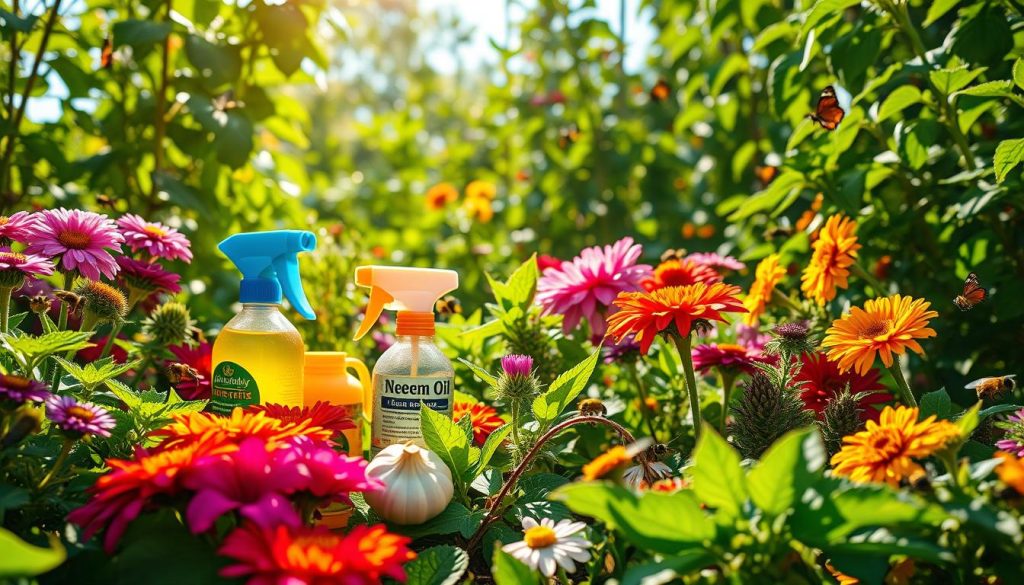
When picking an insecticide, think about the pest and its impact on beneficial insects. Natural insecticides are safer for the environment and humans. By choosing wisely and using it right, your garden will stay healthy and grow well.
Types of Insecticides for Gardens
Protecting your garden from pests requires choosing the right insecticides. It’s crucial to know the different types available. This section will cover the various options, including their advantages and disadvantages. We aim to help you find the best insecticides for your vegetable garden.
Chemical Insecticides
Chemical insecticides are effective but can harm the environment and human health. They should be used with caution and as a last resort. Examples include pyrethroids and neonicotinoids.
Organic Insecticides
Organic insecticides are a safer choice and can be as effective as chemical ones. They are made from natural ingredients and are biodegradable. This makes them a favorite among gardeners looking for safe options. Examples include neem oil and insecticidal soap.
Natural Predators
Natural predators, like ladybugs and lacewings, can control pest populations. These beneficial insects eat pests, reducing the need for insecticides. By creating a balanced ecosystem, you can keep your garden healthy with minimal insecticide use.
Some popular safe insecticides for gardens include:
- Neem oil
- Insecticidal soap
- Ladybugs
- Lacewings
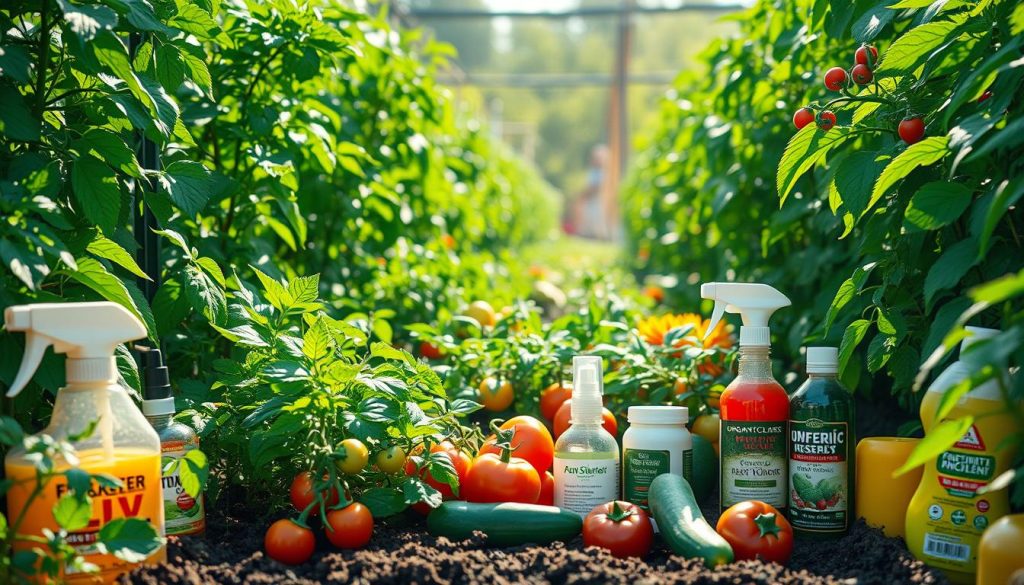
Top Chemical Insecticides for Effectiveness
Chemical insecticides can be a good choice for garden pest control. But, picking the right one is key for the best results. Here, we’ll look at Pyrethroids and Neonicotinoids, two common types used in gardens.
Pyrethroids
Pyrethroids are man-made versions of natural insecticides from chrysanthemum flowers. They work well against many pests, making them a favorite for garden pest control. You can spray them on leaves or soil for quick, lasting results.
Neonicotinoids
Neonicotinoids are systemic insecticides that you can apply to soil or leaves. They get absorbed by the plant, making it toxic to pests that eat the sap. This makes them great for pests that are hard to reach with other sprays.
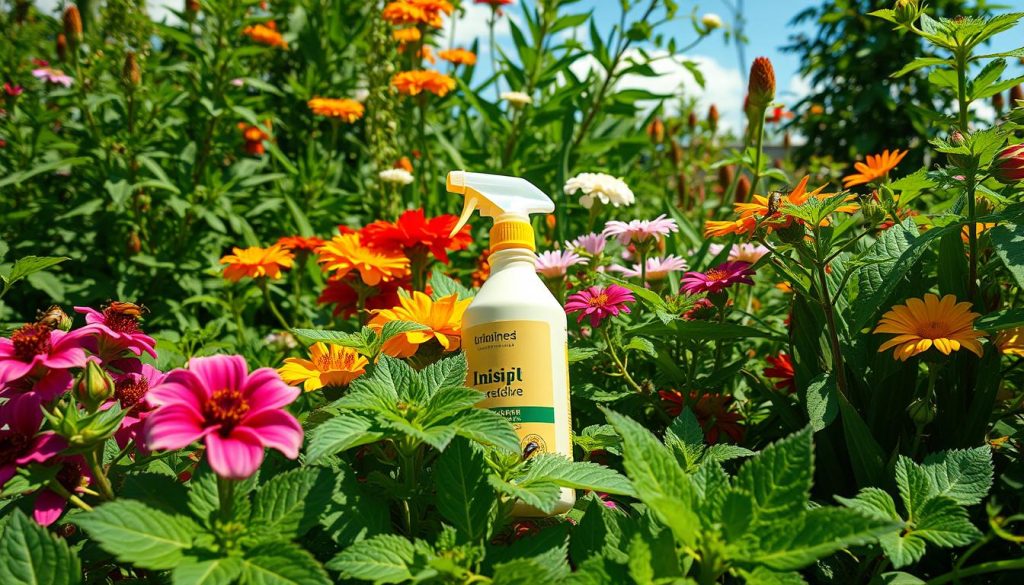
Knowing about different chemical insecticides helps gardeners choose the best option. Whether facing a specific pest or looking for a general solution, there’s a spray for outdoor plants that can help. Always follow the instructions and take precautions for safe, effective use.
Benefits of Organic Insecticides
As a gardener, I’ve learned the value of organic insecticides. They protect my plants from pests safely. They’re better than chemical insecticides because they’re safer for the environment.
Organic insecticides are good for bees and butterflies. These creatures are vital for plants to reproduce. Using natural insecticides helps keep our gardens healthy.
Organic insecticides are better for the planet. They don’t pollute soil and water like chemicals do. This is key for gardeners who want a green garden.
Safety for Pollinators
Organic insecticides target pests without harming bees and butterflies. This is different from chemical insecticides, which can harm many species.
Environmental Impact
Organic insecticides are also better for the environment. They’re made from natural things like plants and minerals. These are safe and don’t harm the soil or water.
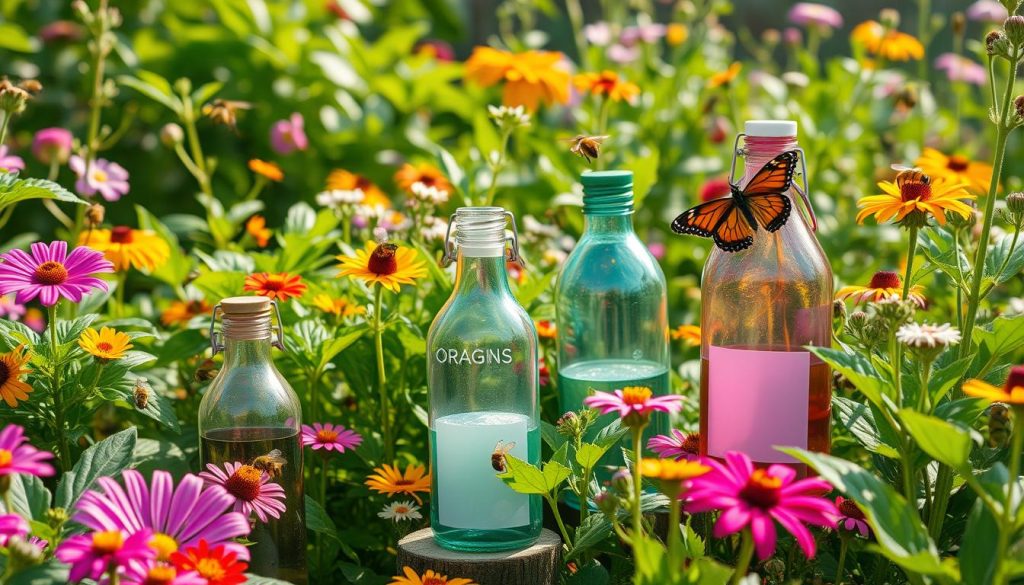
Examples of organic insecticides include neem oil, insecticidal soap, and diatomaceous earth. These natural options are as effective as chemicals but safer for us and the planet.
My Favorite Organic Insecticides
As a gardener, I’ve tried many organic insecticides to keep my garden healthy. I look for the best ones that are safe for the environment and my plants. Neem oil and insecticidal soap are my top picks.
Neem oil comes from the neem tree and fights many pests. It messes with their hormones, stopping them from reproducing and killing them. Insecticidal soap, made from mild dish soap, controls pests like aphids and whiteflies.
Using Neem Oil and Insecticidal Soap
To use these insecticides well, follow the label and take precautions. Here are some tips:
- Always read the label and follow the instructions for use.
- Make sure to spray the insecticides in the early morning or late evening to avoid harming beneficial insects.
- Test a small area of the plant before applying the insecticide to ensure it doesn’t cause any damage.
Benefits of Organic Insecticides
Organic insecticides like neem oil and insecticidal soap are safe for the environment and people. They work well and don’t harm beneficial insects. This helps keep your garden healthy.
Choosing the right insecticides and using them correctly keeps your garden thriving. Always follow the instructions and protect beneficial insects. With organic insecticides, you can have a beautiful, pest-free garden all year.
| Insecticide | Effectiveness | Safety |
|---|---|---|
| Neem Oil | High | Safe for humans and pets |
| Insecticidal Soap | High | Safe for humans and pets |
How to Choose the Right Insecticide
Choosing the best insecticides for your vegetable garden can be tough. There are so many options out there. It’s important to think about what your garden needs and the types of plants you have. Some plants face different pest problems, and not all insecticides are safe for all plants.
To pick safe insecticides for your garden, consider these points:
- Type of pests: Know what pests are bothering your plants. Pick an insecticide that fights those pests.
- Plant type: Different plants react differently to insecticides. Choose one that’s safe for your plants.
- Environmental impact: Think about how the insecticide affects the environment. Opt for eco-friendly options.
By keeping these factors in mind, you can find the right insecticides for your garden. This will help you manage pests and keep your garden healthy. Always read the label and follow the instructions for safe and effective use.
| Insecticide | Target Pests | Plant Type |
|---|---|---|
| Neem Oil | Aphids, Whiteflies | Vegetables, Fruits |
| Insecticidal Soap | Aphids, Spider Mites | Vegetables, Herbs |
Application Methods for Insecticides
Applying insecticides correctly is key for a healthy garden. Knowing how to use them is important. I’ll cover spraying and granular methods to help you protect your plants.
Spraying is common but can be messy. Granular application targets soil pests better. Think about the pest, plant, and environment when choosing.
Spraying Techniques
Spraying insecticides needs skill. Here are some tips:
- Use a fan nozzle for wide coverage and to avoid overapplication.
- Keep the pressure low to prevent plant damage and drift.
- Avoid spraying in strong sun or wind to ensure effectiveness.
Granular Application
Granular application targets soil pests. Here are some tips:
| Method | Description |
|---|---|
| Band application | Apply granules in a band around the plant, about 2-3 inches from the stem. |
| Broadcast application | Apply granules evenly over the entire soil surface. |
Follow these tips to apply insecticides well. Always read the label and follow instructions.
Timing the Application of Insecticides
As a gardener, I’ve found that when to use insecticides is key. It’s important to match the pest type and plant life cycle. The right timing can greatly improve your garden’s health.
The timing of insecticide use depends on several factors. These include the pest type, plant growth stage, and weather. For example, applying during peak pest activity can protect plants. Here are some key timing considerations:
- Apply insecticides during early morning or late evening to minimize disruption to beneficial insects
- Avoid applying insecticides during rainy or windy weather, as this can reduce their effectiveness
- Consider the life cycle of the pest and the plant, and apply insecticides at the most critical stages
By considering these factors and using the best insecticides, you can create a healthy garden ecosystem. Effective garden insecticides protect plants while also preserving beneficial insects and the environment. Always read labels and follow application instructions for the best results.
Dos and Don’ts for Using Insecticides
Using insecticides in your garden needs careful steps for safety and effectiveness. It’s key to use safe insecticides to keep your garden healthy. Always read the labels to know how much to use, safety tips, and how it might affect the environment.
To control pests well, knowing what to do and not to do with insecticides is important. Here are some key points to remember:
- Always follow the recommended application rates to avoid overapplying insecticides, which can harm plants, humans, and the environment.
- Choose insecticides that are specifically designed for your type of garden and the pests you’re trying to control.
- Take necessary safety precautions, such as wearing protective clothing and gloves, to minimize exposure to insecticides.
By following these guidelines and using safe insecticides, you can keep your garden healthy and thriving. Also, you’ll protect the environment. Remember, controlling pests in gardens needs a balanced approach. This approach considers the risks and benefits of using insecticides.
| Insecticide Type | Application Rate | Safety Precautions |
|---|---|---|
| Chemical Insecticides | Follow label instructions | Wear protective clothing and gloves |
| Organic Insecticides | Follow label instructions | Wear protective clothing and gloves |
Maintaining a Healthy Garden Without Chemicals
Insecticides can help control pests, but the best way to keep a garden healthy is with organic and natural methods. Good gardening practices like crop rotation and companion planting help. They create a balanced ecosystem that naturally keeps pests away.
It’s also important to encourage beneficial insects like bees and butterflies. These pollinators are crucial for plant growth and help control pests. By using organic methods and creating a diverse environment, you can have a thriving garden without harsh chemicals.

